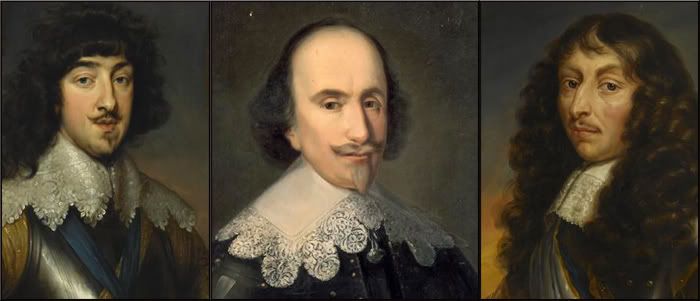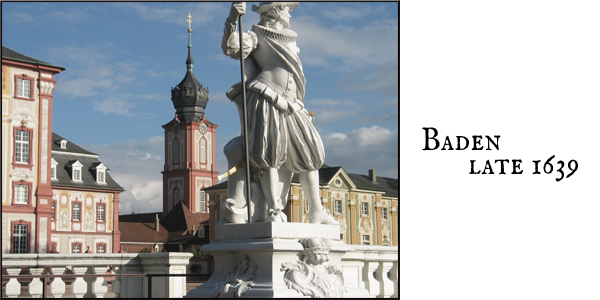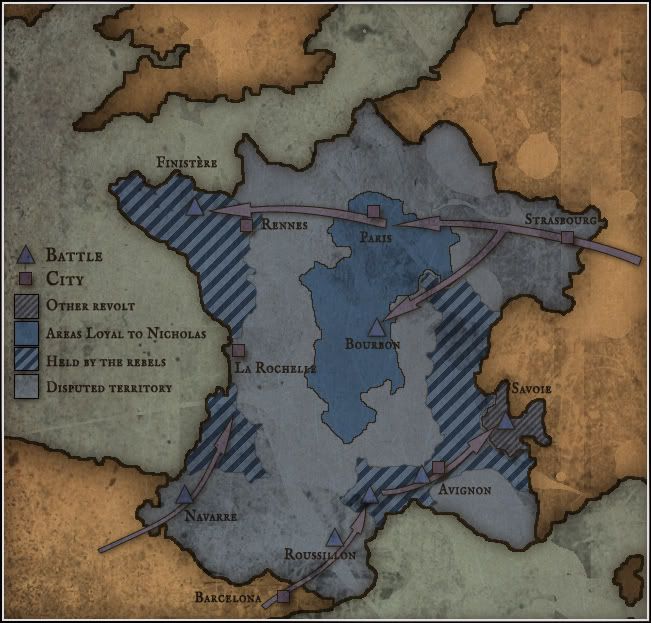Chapter XLI – Frondeurs in Brittany
Northern Gascony was in open revolt by summer 1639. The nobles flocked to the rebel standard citing numerous offences committed by royal executives as their cause for dissatisfaction. As such the causes for the rebellion were not of revolutionary character. Instead the insurgents mainly took up arms in defence of their ancient liberties who were being hampered by the increase in royal authority and centralization. Taking the form of an armed noble opposition with backing from peasant armies in Roussilion, Dauphine and Burgundy, the armies of the second estate fielded several thousand men in their attempt at limiting the power of Nicolas and his advisors. The patchwork of resisters (known as frondeur[1]) consisted thus of a clique of nobles who utilized the general aggravation of the rural populace.
Although their goals were vastly different the two fractions united in this struggle against what the nobles saw as an attack on their political and feudal freedoms while the peasants found their cause in high taxation and forced conscription into the royal armies. Further confusion was added to the situation when a large part of the army revolted in Savoie. Here the ultimate goal was a complete separation from the French state and either incorporation with the kingdom of Savoy or independence from both realms. Their objectives were thus radically different from those of the united front of Frondeurs, but the fractions refrained from campaigning against each other in recognition of the danger which the royal armies presented to them all.
***
Men Discontent of Realm and King
***
Intrigues against Nicolas and his government had been begun as early as the first actions of the scramble for Germany. Discontent and resentful at the King’s increased disregard for domestic problems had estranged many of the older noble houses and his determined foreign policy made many of the military commanders cringe under the constant threat of war. But the unifying force behind the Second Fronde would be a troika of men closer to Nicolas than most.
The princes of the blood Gaston Jean-Baptiste de France (duke of Orleans and younger brother to Nicolas) and Louis II de Bourbon (prince de Condé) both took active part in the opposition. Gaston did so out of obvious dissatisfaction with not being chosen as successor to the French crown when his and Nicolas’ brother was murdered. Furthermore he thought it highly inappropriate for a king to crave as much power as Nicolas did, and saw his brother as a tyrant obsessed with power, who needed to be stopped by the ever conscious nobility. The Prince de Condé was at the outbreak of hostilities still a young man, but never the less much beloved by especially the younger members of the first estate. He too saw himself as a person determined to fight an oppressive royal administration in defence of ancient liberties. Most disturbing though, was the central figure in the noble’s opposition. When the peasants in Brittany had first risen, the province’s governor had not only encouraged them, but added his own garrison to their forces. Governor of Brittany at the time was no other than the duc de Rohan, one of the Three Marshals and member of the Conceil des Affairs.
Gaston duke of Orleans – Henri duc de Rohan – Louis II Bourbon, Prince de Condé
Rohan believed Nicolas to have wronged not only the French people, but also the very French state in his wars, which were fought for personal gain and not for the benefit of religion, state or people. That Rohan threw his lot in with the opposition might seem logical when viewed in this light. To the aging Marshal and diplomat it was France and her subjects that came before anything else. Nicolas was simply not prepared to fight for what Rohan, de Bonne and Sully had believed in; a France where the king reigned for his subjects, where every peasant had a chicken in the pot.
***
Steady steps echoed down the marble-clad corridors as two burly officers passed the array of standards and gears of warriors which plastered the passages. With a powerful stroke the first of them swung a heavy oak door open and the pair hurried inside as a couple of beggars hunting the same chunk of yesterday’s bread.
The room was heavy with smoke from several pipes, tables were filled with maps, documents and letters and here and there a sabre or a pistol lay scattered – there was a certain feeling to the place that made men think and women worry. Filled with men in uniform the room seemed more like a military camp than one of the count of Baden’s best salons. Chairs were soon produced for the two men and the ornate devices creaked under the weight of armour, military orders and weapons.
King Nicolas swung around from his position near a large painting of some Greek myth which he had observed for quite some time. Slowly he neared the two newcomers who sat surrounded by intrigued captains. Stroking his dark brown moustache the sovereign of All the French grabbed a chair close by and arranged his royal person directly before them. The room went silent as the grave…
“Majesty…” the first one began; his fleshy face glowing red from heat and excitement “Majesty I have disturbing news from home”.
A mutter blew through the clouds of smoke hanging under the decorated ceiling. Words such as England, Stadtholder and peace pierced them with vigorous speed. Nicolas buried his face in his hands. This, he was in no mood for. Louder and louder, the many men in the room began to debate whatever the king could, would and should do if such unlikely events were to pass.
Finally Turenne came to his rescue.
“Then tell us man! God’s death, don’t keep such things from your monarch!”
The second took over.
“The Frondeurs now hold Brittany, Gascony and Bourgogne. Conscription can’t take effect..” he produced a silk handkerchief and wiped the sweat away from his pink brow. “The people refuse to pay their taxes and day for day the Princes of the Blood gain more and more support. As it stands now, we are only able to hold Paris and the central part of the country and even then Condé has taken 4,000 men into Bourbon.”
A collective sigh went through the disturbed congregation.
“Majesty, we can’t go on this way. We either have to bring men from the front to secure the country side or else we have to engage into negotiations with them!”
Nicolas slowly raised his head to the two men.
“Monsieur Bassompierre!” his voice rang out as gun-fire at the first of the two men “..what would you, having seen our beloved homeland in this situation, suggest us to do?”
Bassompierre took off his wig and scratched the back of his thick neck.
“Sire, for the good of the state, I beg of you... reconcile with your errant brother... make your peace with…”
He didn’t manage to finish the sentence before Nicolas had flung himself from his chair and placed a well aimed punch at the bulging officer’s nose. Blood sprouted everywhere and the count of Baden let out a high pitched scream as Bassompierre’s recoiling body crushed one of his most delicate stools as the wailing man fell back over; dragging several tables with him in the fall.
“Fool! Imbecile!” Nicolas roared with all his strength. “For the good of the state!” he mimicked condescendingly at the rearranged face staring frightened up at him… “Monsieur Bassompierre, you good for nothing papist, by God’s death you forget yourself!
I AM THE STATE!”
Glaring ferociously, Nicholas turned around and one after one faced all the officers who stood dumbstruck around them. They all lowered their eyes.
Somewhere a bell rang.
“Turenne takes the royal army from Württemberg to Paris at dawn! I want them dead!”
“But sire what of the fronts, what of Germany and Spain… what of the Empire!?” An anonymous voice asked.
“To hell with it! What good is Vienna, Madrid and Turin when I can not even have the Louvre in peace!?”
Campaigns against the Frondeurs
Coming up… Peace Through War/Give Me Liberty Or Give me Death!
[1]Meaning anyone who thought that royal power should be regulated.







